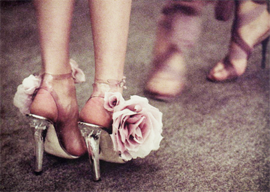
February 28, 2012

Alexander McQueen
A prosperous, roly-poly Greek with a name that sounds like an Aztec root vegetable once proclaimed that if you have a brain, A cannot be both A and not A. Some twenty-one centuries later, a bookworm-poor, reed-thin, dark-cloaked Dane who for most of his life had been unhappy in love replied that if you”re in love, A can be anything.
Aristotle’s proposition was good for building railroads, winning wars, designing machine guns, inventing computers, spreading marmalade on toast, and organizing municipal rubbish collection”in short, for civilization generally. Kierkegaard’s rebuttal was only good for the soul and maybe for haute couture, too.
At times it may look as if science has finally bridged the chasm between the two positions. Our somber-suited physicists speak of subatomic particles” irrational behavior while our crazy-haired artists are calculating enough not to fly commercial. Bankers turn green, flower children file their tax returns on time, and bloodthirsty tyrants call for democratic elections in places we never knew existed.
At other times it seems that instead of the gods that the Age of Reason promised we would become, we now resemble the Dark Ages” idea of the Antipodeans: walking on our heads, Tweeting strangers, and reading our fortunes from cardboard Starbucks cups. Juliet Googles Romeo. They txt, check out Ibiza, and live together like a pair of silicone peas in an iPod. He spends his nights watching porn and she does her own Botox. What other thereafter is there for such wretched heirs to the Age of Reason in a concrete world where A cannot be both A and not A?
Our notion of pleasure is wholly contingent on this dilemma. Should hedonists adopt the Aristotelian view of the global playpen”demanding ever-sweeter sugar, ever-louder music, ever-more Facebook friends, ever-longer orgasms, and ever-thicker lines of ever-purer cocaine, as well as more personal space, quality time, and peace on Earth in which to enjoy them”or should we go for the Kierkegaard option instead?
That would mean eating none but the darkest, bitterest chocolate; subjecting ourselves to the agonies of genuine feeling, which not only ruins the skin but carries the risk of a messy suicide and even a double murder; listening to music whose harmonies are complex and emotionally disturbing, ideally on an old gramophone in a velvet-suffocated room with only a narrow breach in the curtains” faded brocade to admit sunlight; writing love letters on tear-stained, robin-blue Aerogram paper, scorching the mouth with bootleg absinthe, and leaving healthy wives for Moroccan nightclub dancers who turn out to be men; losing money at the tables not as the rich do (idly and painlessly), but like the desperate gambler who loses his one good shirt of cambric linen and goes home to homelessness in silent remorse and freezing rain; and yes, squeezing boldly, like Alizarine Yellow from a fat acrylic tube, into gowns of brilliantly dyed spider’s web and fine Flanders moonbeam, shameless in the décolletage yet straitlaced in the consequences, reflecting in men’s eyes, flirting with one’s own delectable shadow, thrilled to breathe, and dying to love.